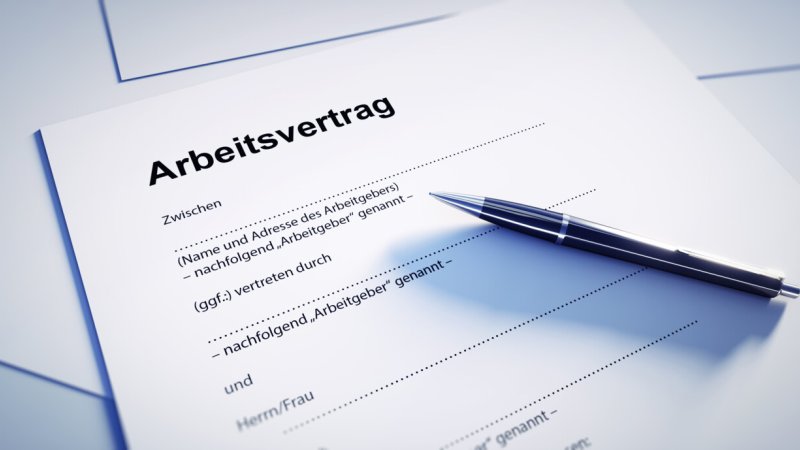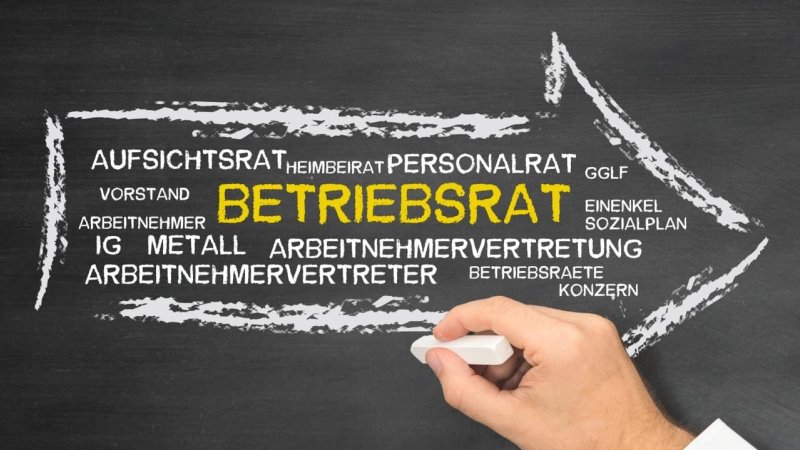
The job market in Germany has numerous rules and regulations. In addition, you must meet some requirements to get a job. Many employers choose their employees mainly based on their certificates or degrees in the desired field. But even without the relevant certificates, you still have a chance to find a job.
Here you will learn about the steps you need to take to start your first job in Germany and the ways you can increase your chances of finding your dream job.
Here are two essential points you need to consider in advance:
- German is spoken in most companies in Germany. In some cases, English will do; but for most jobs, you need to be able to communicate in German. There are many ways to learn German or to improve your proficiency. Find out more in our chapters on "Language".
- You need a work permit before you can start to work in Germany. For migrants, the work permit is directly linked to the residence permit. You can find out more about this in our chapter "Migration to Germany". If you have fled to Germany, whether you can work or not depends on your current residence status. You can find out more in our chapter "Work Permit for Refugees".
Your qualifications - whether a degree or job experience from your home country - need to be recognised in Germany before you start job hunting. Find out more about the recognition of foreign certificates in the chapter "Recognition of foreign certificates". If you do not have a formal degree but have extensive experience in a profession, you can have your qualifications checked. You will find qualification tests (in German, English, Arabic, Farsi, Turkish, French, Russian and Ukrainian) for various jobs at www.meine-berufserfahrung.de.
These tests reveal where you stand professionally. With the result, you can go to the Jobcenter and take another longer test called my skills. This second test enables the Jobcentre and potential employers to better assess your skills and experience and helps you find a job that matches your qualifications. You can also start advanced training ("Weiterbildung") based on your current knowledge and skills. You can seek advice from the Jobcenter or the Employment Agency.
If you do not have a vocational qualification and do not know what career path you should follow, contact a Vocational Information Center ("Berufsinformationszentrum" or BIZ) in your area or seek advice online at Berufenet. There, you can read about various professions and learn more about the typical activities they encompass and the qualifications required for them. The employees in the BIS or the Employment Agency can also tell you in which profession you have a better chance of finding a job in Germany. There is a list of occupations for which there is currently a shortage of personnel in Germany available online - this list is updated as the situation changes in the job market. You can learn more about studying in Germany in our chapter on the University System.
There are various ways to find a job position:
Employment Agency
The first point of contact for job hunting is your local Employment Agency in your area. There, you can register as a jobseeker and benefit from their assistance and advice. On the website of the Employment Agency, you will also find a job search engine ("Jobbörse") where you can search for your ideal job.
Internet
There are a handful of other employment websites on the internet. There you can register and often create a profile to describe your qualifications and experience for the potential employers. Then, these employment websites automatically send you any new job offer that suits your profile, so you do not have to search for new vacancies every day. Employers may also view your profile and consider you for a relevant position. Some major job platforms out there are, for instance, www.monster.de, www.stepstone.de, www.jobbörse.de, www.adzuna.de and the job search engine of Make-it-in-Germany.de, www.heyjobs.de, www.indeed.de, and (for design and creative jobs) www.dasauge.de. There are also some job platforms that are specifically set up for refugees, for instance, www.workeer.de, www.jobs4refugees.de, www.jobbörse.de/refugees, www.work-for-refugees.de, www.careers4refugees.de, www.welcome2work.de and social-bee.de (for Munich and Stuttgart). On these platforms, you can find vocational training positions as well as jobs. Some of these platforms will also help you with your application.
Important: Sometimes, one can use different titles to refer to the same activity. So, while searching for jobs on the Internet, remember to try different titles used for the profession you seek. On berufenet.arbeitsagentur.de, you will also find a list of synonyms for different job titles.
Specific Companies' Website
If you already know which companies you are interested in, you can search for possible vacancies directly on their websites, usually under headlines such as "Jobs" or "Karriere".
Social Networks
Having an account on social networks like Xing or Linkedin can also help you in your job hunting. You can create a profile for free, list your qualifications and professional experience and connect with people from the same field.
Newspapers
You can also find job advertisements in local and national newspapers in Germany. There are nationwide job ads on Wednesdays and Saturdays in the Süddeutsche Zeitung, the Frankfurter Allgemeine Zeitung, the Frankfurter Rundschau, and Die Zeit daily. You can read these newspapers in your local library every day, so there is no need to purchase them.
Job Fairs
You can also get to know about interesting companies and job vacancies at job fairs or companies' so-called “open-door days”. There, you have the opportunity to get in direct contact with the companies. You can find some relevant tips on absolventa.de and a list of various job fairs and the dates they take place on berufsstart.de. In larger cities, regular job fairs are specifically held for refugees.
Counselling Centres
There are plenty of counselling centres where you can seek support while searching for a job. You can find counselling services in your area, for example, at the Youth Migration Service ("Jugendmigrationsdienste" or JMD) and Migration Counselling for Adults ("Migrationsberatungen für Erwachsene "). The staff there speak many languages. You can also contact the "Working and Living in Germany Hotline". The experts there can answer your questions about looking for a job via chat, email and phone in German and English.
Internship
If you are not sure which occupation you would like to follow or if your job applications have been rejected, you can do an internship first. An internship usually lasts several weeks or months. During an internship, you will get to know and try the profession in question and the company - after the internship, you may be able to continue working there. You can read more in our chapter “Internship”.
If you have found an interesting job advertisement, the first step is to apply for it. Most companies require a written application to be sent either by email, per post or submitted over online job application forms some employers set up on their websites. How and when to apply is often mentioned in the job advertisement. Generally, applications are not considered when submitted after the deadline.
Writing a well-articulated application is very important. Usually, the application has to be written in German. In your application, you must describe your qualifications and experience and convince the employer that you are the ideal candidate for the job.
A perfect application consists of:
- A cover letter (usually not longer than a page) in which you describe your experience and qualifications and explain why you would like this specific job.
- A tabular CV with a signature
- Your certificates
- Further evidence of skills and references, e.g. from your former employer
If you have obtained your certificates from abroad, you must have them translated in advance. The Jobcentre or the Employment Agency usually covers the costs of translation. Your adviser at Jobcentre can provide you with more tips on the subject.
If you have certificates and documents from abroad, you must have them translated and, if necessary, recognised in advance. The costs for the translation are usually covered by the Jobcenter or the Employment Agency if you are already in Germany and have been registered at either the Jobcenter or Employment Agency. Your adviser at Jobcenter/ Employment Agency can provide you with more information on the subject. You can find out more about the recognition procedure in our chapter “Recognition of foreign qualifications”.
For useful tips on how to put together a job application, you can check out fluechtlingshelfer.info, make-it-in-germany.de and sueddeutsche.de. You can also seek advice from various counselling centres. Furthermore, you can find counselling centres in your area, for example, at the Youth Migration Service ("Jugendmigrationsdienste" or JMD) and Migration Counselling for Adults ("Migrationsberatungen für Erwachsene"). The staff there speak many languages.
If the company likes your application, you will be invited for an interview. However, your application may also be rejected. If that is the case, don't lose hope, go ahead and apply for other positions at other companies. If you receive an invitation to a job interview, try to prepare for the interview beforehand. You should have some general ideas about the company and position and know how to answer relevant questions. You can find some handy tips on a successful job interview on sueddeutsche.de. Furthermore, you can seek advice or apply for an "application training" ("Bewerbungstraining") at the Federal Employment Agency - ask your advisor for more information about this type of training. You can also find counselling centres in your area, for instance, at the Youth Migration Service ("Jugendmigrationsdienste" or JMD) and Migration Counselling for Adults ("Migrationsberatungen für Erwachsene"). The staff there speak many languages.
A few days or weeks after the job interview, you will often receive a reply from the company to let you know whether you will get the job. If you are chosen for the job, It is important that you read your employment contract carefully before signing it. You can learn more in our chapters “Employment Contract” and “Labour Rights”. If it didn't work this time, do not give up! Just apply for other positions and companies. With some luck, next time you might just find the job you like.
Some of the job offers in newspapers and on the Internet are dubious and not to be trusted. Check employers thoroughly before you pass on your personal details. And if you have already been accepted, read the employment contract carefully before signing.
Here are some tips (in several languages) on how to enter the German job market.
hr integrate supports job-seeking Refugees by connecting them to Human Resources Managers in different organisations.
What does one need to consider when preparing a job application? Fluechtlingshelfer provides you with a comprehensive answer in several languages.
Want to know more about everyday routines of a profession before starting to do the relevant vocational training? Watch Berufe TV's short videos (EN subtitled) to learn more about different jobs in Germany.
Sie sind Softwareingenieur und suchen eine Arbeit in Deutschland? Die Jobbörse GermanTechJobs richtet sich an alle, die in der IT-Branche arbeiten.
Die Website whatjobs.com sammelt viele Jobangebote in Deutschland und weltweit.
Die Webseite HeyJobs.de sammelt viele Arbeitsangebote, Ausbildungsstellen, Praktikumsstellen und Jobangebote für Studierende, Quereinsteiger*innen und vieles mehr.





